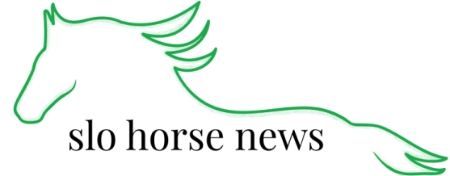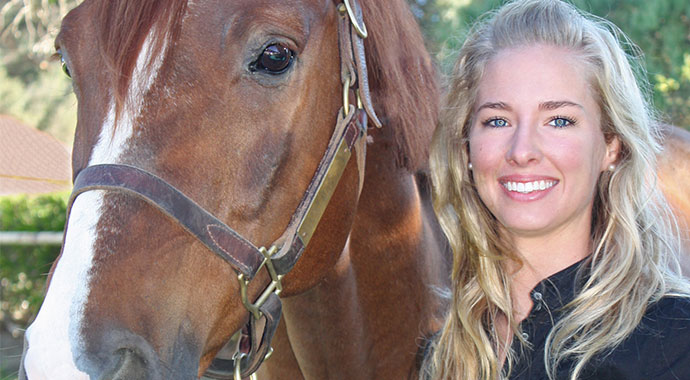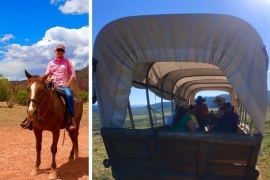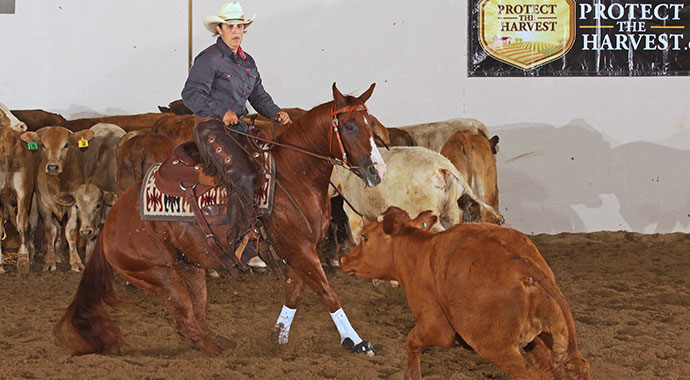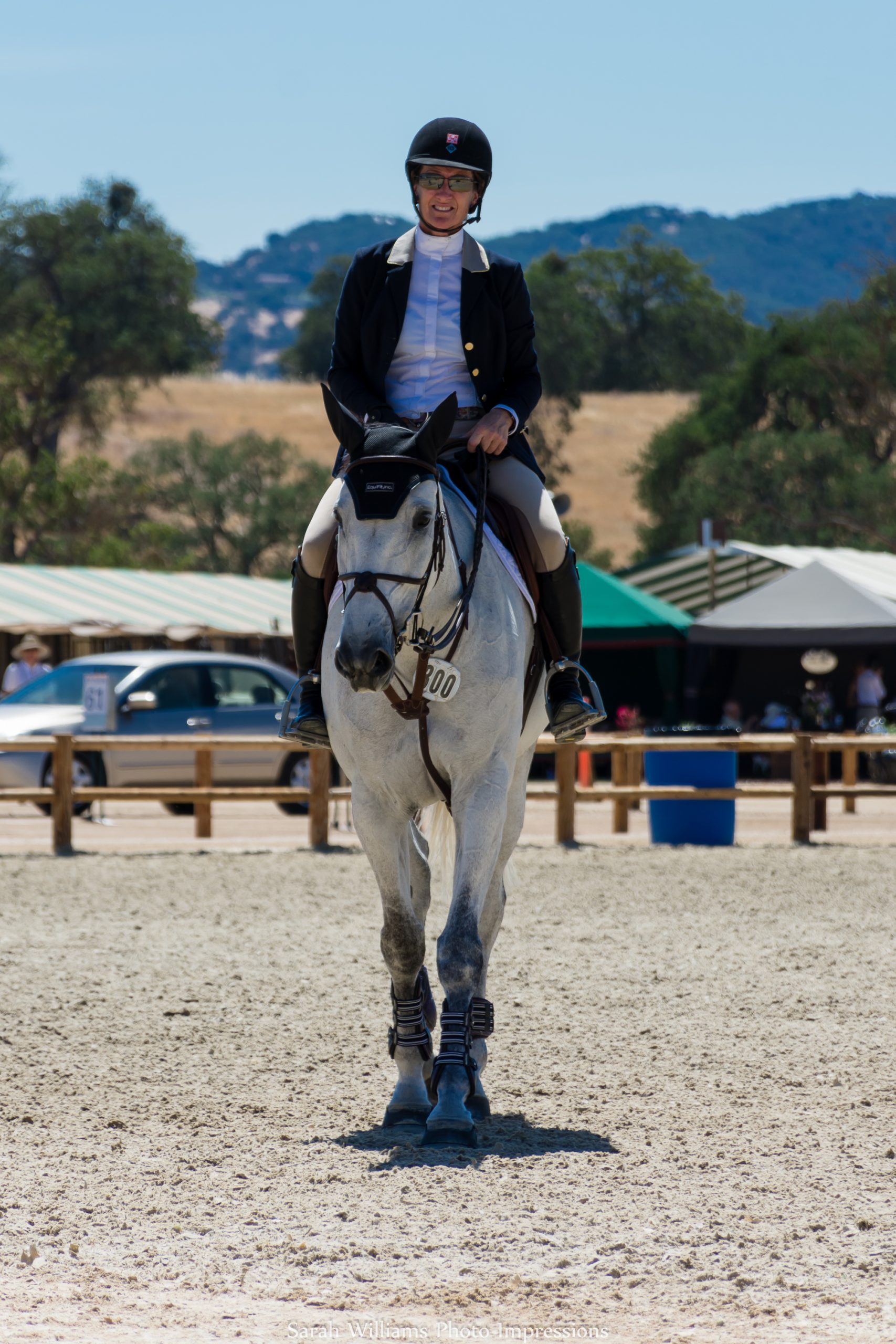“I got the horse bug from my mom”
Natalie grew up in Manchaca, TX, a town on the southern edge of Austin. Where, thanks to her Mom, she began competing and showing throughout middle school and high school on the local Hunter Jumper circuit in Texas.
It’s a bug she couldn’t shake, and her love of horses carried her from the show ring, to an education in the Equine Industry, to discovering her passion of teaching and coaching at the collegiate level.
Natalie Christine Baker is in her first year as the Equine Center Supervisor and Equine Lecturer for Cal Poly University. If the job title alone doesn’t intimidate you, her day to day schedule will redefine what you consider productive.
On any given day you might find her in the office, out in the field checking electric fence, doctoring a horse, helping a student train a horse, helping a mare foal out in a field, moving straw, dragging pens, tractor work, answering emails, in between teaching classes.
“This position is a split between Management and Teaching – it’s a very fun split, always a lot to do and a great method of cross training. It’s a great challenge, and a challenge within an industry I’m passionate about, which I love. I’m very happy in this position.”
“It’s hard to track me on any given day.” – She laughingly holds up two cells phones, “This is why we have two jean pockets.” Before she can put them back down a third phone, the office phone rings and a student knocks on her door. The grace with which she handles her position can largely be attributed to the demanding schedule she set for herself while pursuing her Bachelors at West Texas A&M, and a Masters at Oklahoma State University.
When choosing a university she was looking for a school that had an Equine program, in addition to an Equestrian team. Both of which she found at West Texas A&M University, in Amarillo Texas.
There she pursued a degree in Equine Business and Industry with a Minor in Animal Science. During her time at West Texas she rode on the equestrian team for four years with 40-50 other participants.
Per the persuasion of a professor at West Texas she got involved with the Horse Judging Team despite her reservations in regard to giving reasons, and public speaking.
After graduation she went on to Oklahoma State University to pursue her Masters in Animal Science with an emphasis in Equine Nutrition and Exercise Physiology. While attending OSU she was the only Equine Grad student, a T.A for all Equine courses, working on a research project, as well as acting as the Assistant Coach for the OSU Horse Judging Team.
Her last semester at OSU while at a horse judging contest in Texas, she met Pete Agalos. He asked her what her plans were after graduation, and the seed was planted for this Texas girl to consider a life on the Central Coast of California.
San Luis Obispo wasn’t completely foreign as her uncle, Richard Lee had been living here for some time. So after a few flights and a few interviews she took the position at Cal Poly University. But she’s quick to mention that she didn’t get here on her own:
“The most influential people as far as me getting to this point and finding my passion for mixing teaching with my strong background in horses would be my professors. I’ve had some seriously awesome advisers, coaches and mentors in my life. That started with Dr. John Pipkin at West Texas A & M who is a huge guru in Horse Judging and equally influential in the Quarter Horse and Equine Industry overall. It continued at OSU with Dr. Steven Cooper, who really helped solidify my passion for teaching and coaching. He showed me how it was done and then let me grow in independence to a position where I was coaching the Horse Judging team practices by myself, and taking them to shows by myself. I had some incredible people who gave me the independence at the right time and helped guide me in a supportive way, without pressuring me to do one thing or another. “
The Equine Center Supervisor is an incredibly demanding position to fill due to the fact that it encompasses management over the Equine Center’s eight student employees, a herd of roughly eighty five horses, Dressage and Equestrian Teams, the Thoroughbred and Quarter Horse Enterprise, and a host of students enrolled in Equine courses at Cal Poly University.
Natalie’s enthusiasm for her job might make the load a touch lighter. Whether it’s the challenge of the position or her love for the students that keeps her coming back, we haven’t decided.
One of the many aspects of the equine center under her management is that of the Thoroughbred and Quarter Horse Enterprises.
The Thoroughbred Enterprise is where students take foals born at Cal Poly and begin halter breaking them as weanlings. They work on grooming, tying, leading and exercising up until they are “long yearlings” roughly 1 ½ years old. During this time the students are also working on prepping them for sale which includes precise grooming methods, and showing them in hand to perspective buyers. These thoroughbreds are then sold into the racing industry – either to people who will begin their training or use them for broodmares in their own racing programs.
Natalie has also begun work on revamping the Thoroughbred enterprise by means of retiring older mares in the hopes of bringing in some solid young broodmares. The mares are then bred to outside Stallions, and the foals enter the Thoroughbred Enterprise.
The Quarter Horse Enterprise differs in that the horses are taken much farther in their training. When the foals reach three to five months of age they go through the halter breaking class. This is where they are taught leading, tying, grooming, and trailering much like the Thoroughbred Enterprise. Those foals are then turned out for a year and half until they are “long yearlings”.
These horses are then taken off pasture and taken through the Cal Poly Colt Starting class. This is where the students learn to lunge them, ground drive them, saddle them and then they begin breaking them. In the spring they are then taken through the Quarter Horse Enterprise. This is where they fine tune their skills. Being that most of the horses are bred for cutting, they spend this time getting them started on cattle, and regularly out on the trails.
After which time they sell them at a yearly public auction hosted at Cal Poly University. In 2013, Cal Poly forwent the auction due to the fact that the 2012 auction went very poorly, with record low numbers in attendance. This coupled with the fact that the horses sold were done so for a monetary value much lower than the value of the horse.
This led the Equine Department to operate by private trading, online advertising, and a horse sale webpage in 2013. These sites advertise older riding horses, broodmares, two year olds who went through the Quarter Horse Enterprise, and riding horses. Cal Poly’s goal is host a public auction again in the summer or early fall of 2014.
Another aspect of her position is that of managing the Cal Poly herd of horses, encompassing roughly 85 horses in all. Natalie has to be able to justify each horse on the property, so they strive to have every horse serve two different jobs in order to maintain efficiency with their herd. The roles carried out by these horses are varied – Class horses, practice horses, brood mares, riding horses, reproduction horses, practice horse for shots and vaccinations, equestrian and dressage team horses.
Natalie explains that while Cal Poly is currently in need of more middle-aged geldings to be a part of the nutrition herd and replace older riding horses – each horse that is brought into the Cal Poly Equine program goes through a rigorous screening process. This includes approval by all Equine faculty members, an examination by Cal Poly’s Vet, followed by a trial based acceptance where Natalie tests them for how well they work with students, are they safe to handle, safe to ride, and are they suitable to purpose.
While her professional life centers on the Equine Industry she attributes her continued enjoyment of horses after clocking out, to her Mom.
“Mom has been really influential because she always kept it fun. I get to go home to see my family in Texas now and ride my pasture ornaments. It’s really awesome to have family who are supportive and when you wanted to show they helped you show and now I get to go home and I get to go out with my whole family on horseback and we go trail riding together. They’ve been really influential in always having horses in my life at whatever position I was in at that time.”
“I love Texas and I love Oklahoma, and I had great experiences in both of those states. But I would have to say that everything good that people told me about SLO, this part of California, and this university is really true. That’s one of the beautiful things about working here, this area and Cal Poly lives up to its reputation.”
“Truly through the support of very influential people in my life, starting in my undergrad throughout those four years and then into my masters, got me to where I am today. It allowed me to meet Pete Agalos at a Horse Judging contest six years later, and here I am. This area is awesome, and I couldn’t have picked a more beautiful place to live, or better faculty members to work with.
Although they failed to tell me about the drought.”
